Stories from the front lines of California’s unmet health care needs
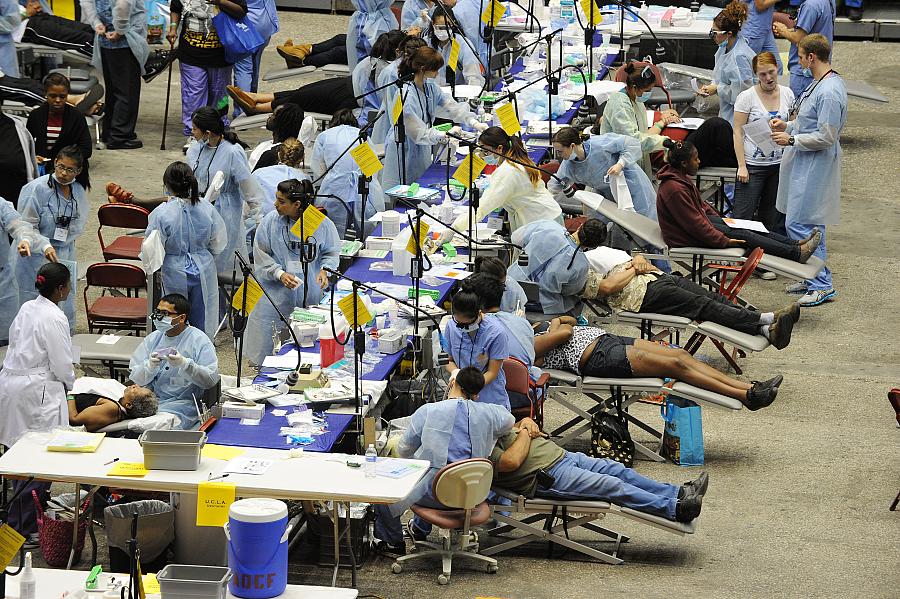
The annual three-day mega clinic coordinated by the nonprofit Care Harbor. (Photo: Robyn Beck/AFP/GettyImages)
Inside a giant 850,000-square-foot building in downtown Los Angeles, hundreds of people lined up before dawn recently, seeking help for an aching tooth, a new pair of bifocals or specialty care they otherwise can’t get, all at no cost.
The annual three-day mega clinic is coordinated by Care Harbor, a nonprofit organization that brings together resources and hundreds of volunteers to provide free medical, dental, vision and preventative care to uninsured and underinsured residents. Organizers say the goal is to fill the gaps in health care needs that still exist in Los Angeles County and across California.
While the need has declined as more people become insured, thousands still turn to the clinic, primarily for dental and vision care. In 2012, there were 3,758 people admitted for services to the mega clinic. Last year, that figure dropped to 2,151.
Today’s scenes are different than those from a decade ago, when mega-clinics, held across the country and primarily in rural settings, became symbols of the huge number of uninsured before the Affordable Care Act. Many Americans from rural areas drove hundreds of miles to get an abscessed tooth pulled or an expensive prescription filled. With President Donald Trump and the GOP’s ongoing attempts to dismantle key provisions of the ACA, some predict such mega-clinics will only rise in demand.
But California may be the exception, said Walter Zelman, professor and chair for the Department of Public Health at California State University, Los Angeles. Zelman has lectured extensively on California’s efforts to cover the uninsured. California has come a long way, he said, and will likely continue to make strides for health care for all. The ongoing need for such clinics shouldn’t be blamed on the Affordable Care Act, he added.
“The main people who go to these clinics are not eligible for Medicaid, mostly because they are undocumented,” Zelman said. “It's not a matter of the ACA working or not. The two issues are different. It's just a matter of (whether) policymakers want to include these services in pubic programs.”
California can claim considerable success in reducing its uninsured population since the Affordable Care Act was rolled out. The state’s uninsured rate fell to 7 percent last year, a 10 percent drop from 2013, the largest such decline in the nation. Medi-Cal, the state's Medicaid program, now covers more than 13 million people, including childless individuals and undocumented children.
In Los Angeles County, 1 million people remain uninsured, mostly undocumented Latinos.
Here are a few of the stories of Los Angeles County residents who turned to the Care Harbor health fair this year:
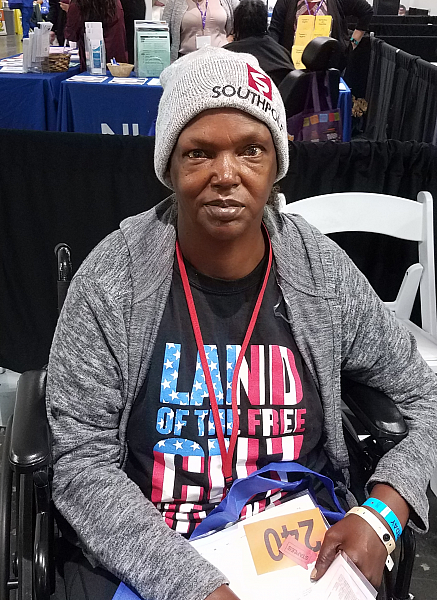
As a veteran living in a homeless shelter in Bell, Debbie James said some health needs remain out of reach.
She receives medical care through Medicaid and the VA, but that isn't enough for the extras: a pair of new glasses so she can read. A set of dentures to hide a missing top tooth. A hearing aid.
A friend at the homeless shelter told her about the Care Harbor clinic. She was happy to attend, she said, even if she didn't expect to get all she needed. Still, just to see so many volunteer dentists and doctors, nurses and other providers gave her hope.
"I think it's good to see so many people get this care, especially the children," said James, who served as an Army medic in Vietnam from 1974 to 1975.
"A lot of people don't have insurance or enough insurance," she said. "The way they care for us here, I think it's a blessing."
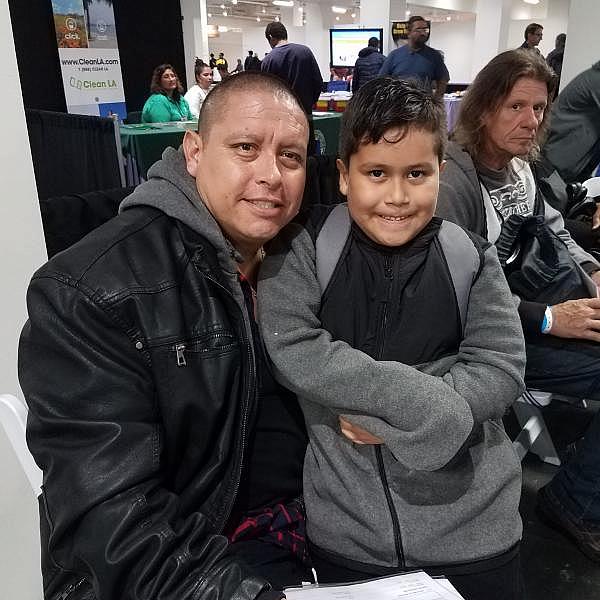
The first time Oscar Avelar came to the Care Harbor event, he had two cavities filled. He returned this year to get a molar capped, a dental cleaning for his son, and glasses for his two daughters.
Avelar, an undocumented immigrant and a mechanic by trade, said he could go to clinics that offer such services for those who are undocumented, but the costs are unaffordable .
His 6-year-old son, also named Oscar, is a U.S. citizen and has Medi-Cal and Denti-Cal, the state’s dental program for Medicaid enrollees. But his son also has autism, and Avelar said clinic organizers told him there was a pediatric dentist on hand who knew how to work with children with special needs.
“Just to pick up and go to a doctor for many of us isn't easy,” he said. “This is different. These services are so good.”
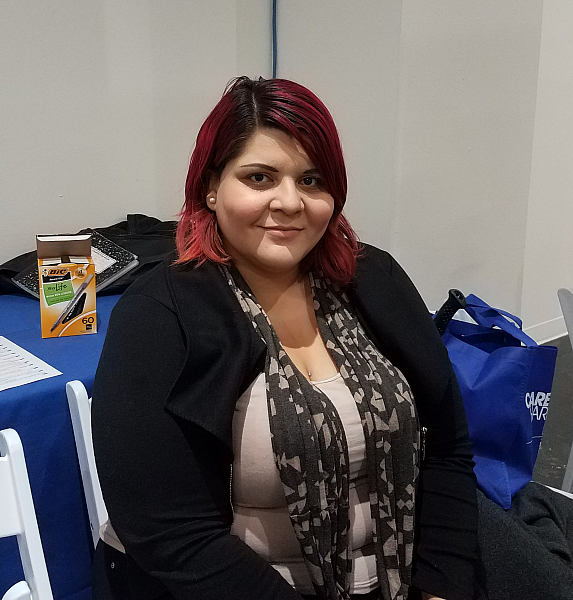
When she returned to school to study graphic design full time, Aracely Quintana said she had to leave her job and with it, her health insurance with Kaiser Permanente.
Now only three weeks into coverage under Medi-Cal, California's version of Medicaid, Quintana said she is still unfamiliar with the kind of care she's eligible for. So as a precaution, she attended the Care Harbor free clinic for new glasses. While here, she also visited a chiropractor and received an acupuncture treatment.
“I'm going to get as many services as I can,” she said. “Diabetes and high blood pressure run in my family. We talk about how we have to be aware of our health.”
Though she was covered by private insurance for years and felt more secure with it, she said easy access to doctors wasn’t always guaranteed.
“I think this is a good example of the way it should be,” she said. “I wish all health care was as easy as this.”
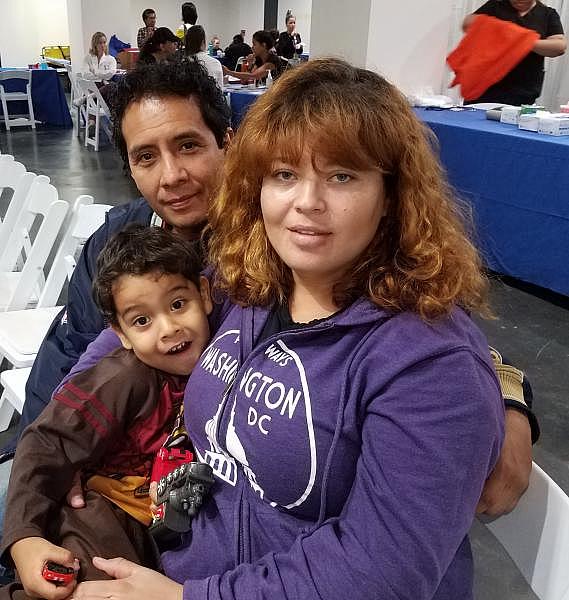
When Yareni Sanchez was pregnant three years ago, she learned about a special insurance program called My Health LA.
Those who qualify for My Health L.A. are undocumented, live in Los Angeles County and have an income at or below 138 percent of the federal poverty level. T Other counties, such as San Francisco, offer similar services. The program continues to grow. Last year, Los Angeles county officials allocated $64 million to the program to cover 150,000 people.
Through My Health LA, Sanchez said she receives everything from women's wellness care to basic preventative services and is grateful. But like many who attended the Care Harbor event, glasses and dental services were out of reach for her.
She came to the clinic with her husband Victor Sanchez and her son.
“I've come to this event many times,” Sanchez said. “All these services help the community so much.”
[Photos by Susan Abram for CHJ]

